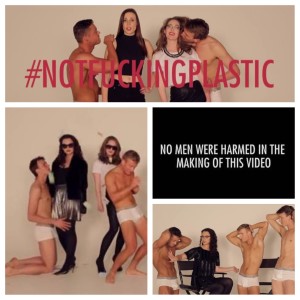Latest Perspectives
View All Latest PerspectivesLaw Revue Girls’ “Defined Lines”
Another parody video, Law Revue Girls’ #Defined Lines wages a full frontal attack against the words and themes of the original song and the supporting video, and makes no apologies for it. It also contrasts with the first video in that it is plausible that these men and women might actually go home together…if the women accepted the men.
In this effort, the video’s protagonists clarify the blurry lines with sharp instruction, schooling the men in the video about sexual harassment and other sex crimes in a humorous but biting fashion, shaking off the men’s advances all the while. They threaten violence (“we’re feeling the frustration/from all the exploitation/prepare for your castration”), but let’s not forget that the now ubiquitous original does, too: (“I’ll give you something big enough to tear your ass in two”). Ouch.
Reasonable people can disagree about fighting fire with fire, but in this case turning the tables is a fairly effective way of causing some men to feel as uncomfortable as some women feel watching the video of the original song (You can see this discomfort in the comment thread beneath the video). And again, while this is a pointed statement, it is also a parody of the original.
Why is it OK to suggest violence toward women, but not men? It isn’t, and that’s what this video is articulating rather directly. If men don’t like it, they shouldn’t do it to women, in verse or otherwise. Women shouldn’t do it to men, either, but in this case the @Law Revue Girls are deliberately pushing buttons, and dialing the discomfort up to the max, to make sure their points about female objectification are heard loud and clear. Some examples, sung in the alternating sing-song/rap cadence of the original song:
• “I apologize if you think my lines are crass/Tell me how it feels to get verbally harassed.”
• “If you wanna get nasty/Just don’t harass me/You can’t just grab me/That’s a sex crime.”
• “We aren’t good girls/We are scholastic/Smart and sarcastic/Not fucking plastic.”
• “You want a landing strip?/You better get ripped.” (This one is interesting, in that it tells the man that if he wants something special or aspirational from his woman, he has to be or deliver something aspirational himself – an idea that is not expressed as commonly as it probably should be).
• Sticking a vibrator in a man’s mouth, presumably in response to the frequency with which women are portrayed with something phallic-shaped, or lickable, in their mouths in popular culture.
• Smearing whipped cream all over a man’s face and dropping the line: “You the hottest bitch in this place” in favor of “Don’t want you to cum in my face,” presumably in response increased references to such activity throughout popular culture in recent years.
This remake of #Blurred Lines delivers on its promise of defining the so-called blurry lines a bit better. The lines it concerns itself with are lines of respect and consent, and flirtation and bullying. It’s a sexist and reductive response to a sexist and reductive video, and it threatens some male viewers in the same way female viewers are habitually offended and threatened by the volumes offensive pop cultural narratives they consume about themselves regularly. So while the video is not kind or polite, it serves the purpose of pushing buttons and changing the conversation, which is more positive than negative, at least in my view.

